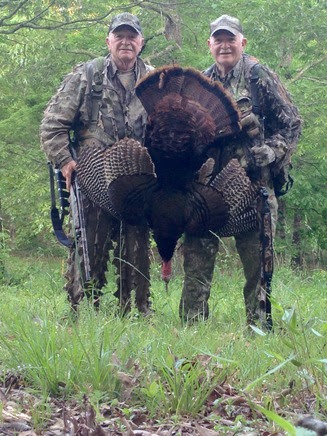
The statewide Georgia turkey hunting season opens on private land on Sat., March 30, 2024, and on public lands, including Wildlife Management Areas (WMAs) and National Forest land, on Sat., April 6, 2024. Turkey season ends statewide (on both public and private land) on May 15, 2024, according to the Georgia Department of Natural Resources’ Wildlife Resources Division.
“Looking back to 2022, statewide turkey reproduction averaged 1.5 poults per hen, which was on par with the average over the past decade, but lower than 2021’s 10-year record high,” explains Emily Rushton, Wildlife Resources Division wild turkey project coordinator. “While that will likely translate into fewer adult birds this spring compared to last year, the number of available gobblers will likely be comparable to the past few years.”
What can hunters expect across state regions this spring? All regions of the state had decreased reproduction from 2021 to 2022, but the Coastal Plain regions in the southern half of the state had the biggest dip, due to the high production in 2021. The Blue Ridge, Ridge & Valley, and Piedmont regions had slight decreases, but have still hovered around the same 1.5 poult-per-hen average.
According to Rushton, “I often have hunters ask if there has been a change in poult production since the season dates and bag limits were adjusted in 2022. The short answer is that it is still too soon post-regulation change to know. Many factors, including weather, mast crop, and insect availability all affect poult production from year-to-year, so to provide a better, science-driven understanding of the turkey population’s trajectory, we will need quite a few years of data.“
The daily and season bag limits are one gobbler may be taken per hunter per day, and a season total of two gobblers. On WMAs and National Forest land (outside of WMAs), the bag limit is one gobbler per area.
All turkey hunters, including those under 16 years of age, landowners, honorary, lifetime, and sportsman license holders, must obtain a free harvest record each season. Before moving a harvested turkey, hunters are required to immediately enter the date and county on the harvest record, and within 24 hours, must complete the reporting process through Georgia Game Check. More information at GeorgiaWildlife.com/HarvestRecordGeorgiaGameCheck.
Resident youth hunters under age 16 will not need a license. Hunters age 16 years or older (including those accompanying youth or others) will need a hunting license and a big game license unless hunting on their own private land. Get your license at GoOutdoorsGeorgia.com, at a retail license vendor or by phone at 1-800-366-2661.
Hunters, did you know that each time you purchase a recreational license or equipment used to turkey hunt, such as shotguns, ammunition and others, you are part of the greater conservation effort for wildlife in Georgia? Through the Wildlife Restoration Program, a portion of the money spent comes back to states and is put back into on-the-ground efforts such as habitat management and species research and management. So, thank you hunters!
Don’t Be a Turkey! Tips For a Safe Turkey Hunting Season
Are you heading out for a turkey hunt this year? Before you go, be sure to review turkey hunting safety tips before heading to the woods, encourages the Georgia Department of Natural Resources’ Wildlife Resources Division.
“No matter how long you have been hunting, it is important to think about safety precautions specific to that type of game,” advises Jennifer Davison, statewide hunter education administrator with the Wildlife Resources Division. “When you emphasize safety, you exhibit important lessons to those hunting with you and ensure that everyone will get back home safely.”
Turkey Hunting Safety Tips:
- Never wear red, white, blue or black clothing while turkey hunting. Red is the color most hunters look for when distinguishing a gobbler’s head from a hen’s blue-colored head, but at times it may appear white or blue. Male turkey feathers covering most of the body are black in appearance. Camouflage should be used to cover everything, including the hunter’s face, hands and firearm.
- Select a calling position that provides at least a shoulder-width background, such as the base of a tree. Be sure that at least a 180-degree range is visible.
- Do not stalk a gobbling turkey. Due to their keen eyesight and hearing, the chances of getting close are slim to none.
- When using a turkey call, the sound and motion may attract the interest of other hunters. Do not move, wave or make turkey-like sounds to alert another hunter to your presence. Instead, identify yourself in a loud voice.
- Be careful when carrying a harvested turkey from the woods. Do not allow the wings to hang loosely or the head to be displayed in such a way that another hunter may think it is a live bird. If possible, cover the turkey in a blaze orange garment or other material.
- Although not required, it is suggested that hunters wear blaze orange when moving between a vehicle and a hunting site. When moving between hunting sites, hunters should wear blaze orange on their upper bodies to facilitate their identification by other hunters.
For more hunting information, visit GeorgiaWildlife.com/hunting/hunter-resources.


Chattooga Schools
GNTC Basic POST Certification graduation held July 22

Bulloch Public Safety
07/25/2024 Booking Report for Bulloch County

Chattooga Schools
Chattooga County Schools: Superintendent Helie’s Welcome Letter

Chattooga Local News
Fall Armyworms Confirmed in Northwest Georgia Counties

Chattooga Schools
Entrepreneur seeks degree at GNTC

Bulloch Public Safety
07/08/2024 Booking Report for Bulloch County

Bulloch Public Safety
07/22/2024 Booking Report for Bulloch County

Bulloch Public Safety
07/02/2024 Booking Report for Bulloch County

Bulloch Public Safety
07/16/2024 Booking Report for Bulloch County

Bulloch Public Safety
07/03/2024 Booking Report for Bulloch County



